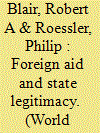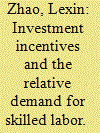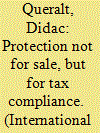|
|
|
Sort Order |
|
|
|
Items / Page
|
|
|
|
|
|
|
| Srl | Item |
| 1 |
ID:
178726


|
|
|
|
|
| Summary/Abstract |
What are the effects of foreign aid on the perceived legitimacy of recipient states? Different donors adhere to different rules, principles, and operating procedures. The authors theorize that variation in these aid regimes may generate variation in the effects of aid on state legitimacy. To test their theory, they compare aid from the United States to aid from China, its most prominent geopolitical rival. Their research design combines within-country analysis of original surveys, survey experiments, and behavioral games in Liberia with cross-country analysis of existing administrative and Afrobarometer data from six African countries. They exploit multiple proxies for state legitimacy, but focus in particular on tax compliance and morale. Contrary to expectations, the authors find little evidence to suggest that exposure to aid diminishes the legitimacy of African states. If anything, the opposite appears to be true. Their results are consistent across multiple settings, multiple levels of analysis, and multiple measurement and identification strategies, and are unlikely to be artifacts of sample selection, statistical power, or the strength or weakness of particular experimental treatments. The authors conclude that the effects of aid on state legitimacy at the microlevel are largely benign.
|
|
|
|
|
|
|
|
|
|
|
|
|
|
|
|
| 2 |
ID:
187858


|
|
|
|
|
| Summary/Abstract |
This study evaluates the effects of China's 2014 and 2015 accelerated depreciation policies on the relative demand of firms for skilled labor. We develop a simple model to explore how the policies affect the relative demand of firms for skilled labor and illustrate the roles of financing constraints and tax compliance in mediating the policy effects. We then employ a firm-level dataset from China's A-share listed companies and use a quasi-experimental design to examine the model predictions. We find that the policies significantly increase the relative demand of firms for skilled labor. The channels underlying the policy effects are that the policies generate additional cash flow for firms, stimulate investment and, thus, raise the demand of firms for skilled labor with the presence of capital–skill complementarity. We also find that the positive effects of the policies on the relative demand for skilled labor are primarily significant for firms with strong financing constraints and high tax compliance. Moreover, we document the positive effects of the policies on R&D investment, firm value added, productivity, workers' benefits, and corporate social responsibility performance, which further corroborate our main results.
|
|
|
|
|
|
|
|
|
|
|
|
|
|
|
|
| 3 |
ID:
157359


|
|
|
|
|
| Summary/Abstract |
How do rulers raise taxes when the fiscal capacity of the state is weak? I argue that, in conditions of low fiscal capacity, rulers might secure high tax yields by granting protection from competition to key domestic producers. I offer qualitative evidence of this exchange in the developing world today and test the theory against a sample of thirty-two developing states in Latin American, Eastern Europe, and the former Soviet Union circa 2005. Results indicate that, conditional on poor fiscal capacity, declining industries pay higher taxes (or evade less) if governments grant them tariff protection from international competitors. The results add to recent scholarship that studies the conditions under which entry barriers—which are otherwise inefficient institutions—result in second-best solutions for states whose capabilities are still consolidating. My findings suggest that trade protection does not always stem from rent-seeking by government. This article therefore offers a new, alternative hypothesis to canonical models in international political economy.
|
|
|
|
|
|
|
|
|
|
|
|
|
|
|
|
|
|
|
|
|